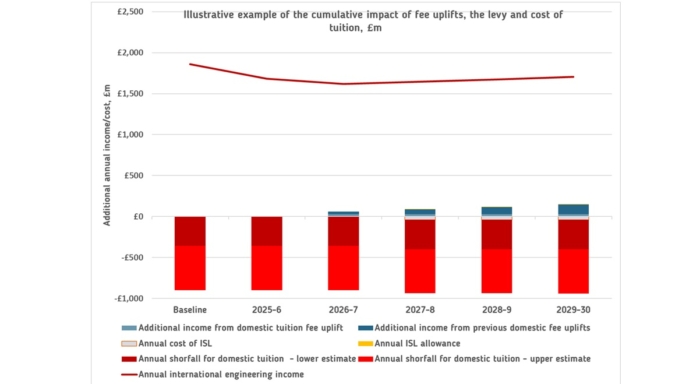The Office for Students has just launched a consultation on one of the most important changes to its practice since its inception. What does it say? We’ve summarised the key takeaways. We have also published a personal perspective on the wisdom of the proposals by the EPC Chief Executive.
In 2017, the Higher Education & Research Act (HERA) dissolved HEFCE, which was a funding body, and replaced it with the OfS which began work the following year as the regulator of higher education in England. In the process it subsumed the remaining activities of HEFCE and OFFA (the Office for Fair Access).
Since then, some of OfS’s main activities have included establishing a register of approved higher education institutions and signing off on the ‘Access and Participation Plans’ of those institutions that want to be able to claim funding via the Student Loans Company.
The OfS’s regulation of HE quality and standards has been through signalling and recognisable processes, mostly farmed out under a contract with the QAA. There have been a few interventions from OfS on grade inflation, unconditional offers and TEF, but these haven’t been accompanied by significant new regulatory controls.
Although OfS does have powers in case of failure (and it has used them by rejecting the registration of a few institutions), its light-touch approach was in keeping with the spirit of HERA, which, during its difficult passage through the Lords was amended to include an explicit commitment to the autonomy of higher education institutions (HEIs) over their admissions and the education they deliver.
But now the OfS is consulting on a what it calls “tougher minimum standards” with the threat of fines and even deregistration for HEIs that don’t meet them. These powers, it is proposed, will be exercised not merely at an institutional level, but at a subject level too, which, in effect, might allow OfS to exert direct or indirect pressure on an HEI into closing a department whose metrics looked like underperformance.
The EPC will be responding to this consultation on behalf of members and we’re keen to hear what you think. We will be inviting members views through a survey shortly. (Come back here for the link.) To help you, we’ve provided the following summary of the proposals.
So what are the proposals? There are four areas:
1. “Define ‘quality’ and ‘standards’ more clearly for the purpose of setting the minimum baseline requirements for all providers”
‘Quality’ will be defined in a metric way. This is, it is said, intended to reduce the regulatory burden. The metrics will relate to five areas: access and admissions; course content, structure and delivery; resources and academic support; successful outcomes; secure standards.
The inclusion of ‘access’ does not mean wider participation targets, but rather admitting students who “have the capability and potential to successfully complete their course”. OfS has been explicit in saying that it “is not acceptable for providers to use the proportion of students from disadvantaged backgrounds they have as an excuse for poor outcomes”. In other words, they are rejecting the idea that non-academic circumstances or lower prior attainment might be mitigating circumstances for lower (according to the metrics) student outcomes. The argument put forward is that using the greater challenges of certain students as an “excuse” would “risk baking disadvantage into the regulatory system”.
The goalposts will be different for new HE institutions, because they can’t be judged on track record.
OfS will also set ‘standards’ for higher education – that is any courses beyond A level or equivalent (so that means drawing higher apprenticeships and other programmes into a unified quality framework). These standards will involve “sector-recognised” definitions of achievement – in other words, OfS intends to establish common standards for degree grades.
2. “Set numerical baselines for student outcomes and assess a provider’s absolute performance in relation to these”
OfS would impose “a numerical baseline”: this is intended to be a cliff edge for outcomes metrics, namely continuation to second year, course completion and progression into graduate-level work or further study. (There’s also a reference to employer satisfaction, but as there are no measures for that, it’s only an aside.) If you fall off the cliff, there’s a range of sanctions (see below) including fines or even deregistration of the institution.
What will matter is absolute – not relative – data. There is a reference to considering the context, but this is more to do with what may have changed rather than a profile of the student body. Unequivocally, the consultation paper states, “We would not set lower regulatory requirements for providers that recruit students from underrepresented groups, or with protected characteristics.” The idea is to spell out “more challenging” minimum standards that students can expect.
Further consultation will be conducted around the exact metrics.
3. “Clarify the indicators and approach used for risk-based monitoring of quality and standards”
As the metric used for the baseline are about things that have happened in the past, the OfS proposes to keep an eye on potential risks in institutions by monitoring other metrics and being clear about which metrics those are. Among those mentioned are admissions data (offers, grades achieved, student demographics), student complaints, National Student Survey results, other regulators’ and PSRBs’ activities, TEF, and the outcomes metrics as above. It should be noted, by the way that NSS is currently under a separate OfS review and we’ve been awaiting the publication of an independent Review of TEF for DfE for nearly two years (which is believed to be critical).
There may be some extra data gathering and reporting for universities, but the intention is to minimise the need for unnecessary interference in the long-run by identifying risks before they become problematic outcomes.
4. “Clarify our approach to intervention and our approach to gathering further information about concerns about quality and standards”
This proposal sets out what might be called a precautionary approach to intervention. In other words, the OfS makes it clear they would be willing to step in to investigate or gather evidence in the case of a feared risk of an institution failing to meet quality thresholds.
It also sets out their available “enforcement” actions: impose conditions on an institution in order for it to continue to be registered; issue a fine; suspend some of the privileges of being registered (such as access to student loan funding for fees or OfS public grants); remove an institution’s degree-awarding powers or its right to use ‘University’ in its title; deregistration.
Please note: This precis is intended as guidance only. The aim has been to summarise the proposals objectively while providing some interpretation of their implications. Necessarily this involves some subjective inference and the omission of details. We advise referring to the OfS’s own consultation documents for the full details. Also, if you feel we have interpreted any proposals wrongly, unfairly or left out critical details, please let us now and we can make changes to this summary as needed.




